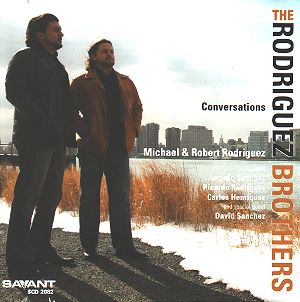1. Rowdy Rod
2. Guayaquil
3. Lerida
4. Rude Awakening
5. Spin
6. Intro to Conversations
7. Conversations
8. Midnight Excursion
9. El Manicero (The Peanut Vendor)
Robert Rodriguez – Piano (tracks 1-5, 7-9)
Michael
Rodriguez – Trumpet, flugelhorn
David
Sanchez – Tenor sax (tracks 4, 8)
Carlos
Henriquez – Bass (tracks 1, 3, 4, 7, 8)
Ricardo
Rodriguez – Bass (tracks 2, 5, 6, 9)
Antonio
Sanchez – Drums (tracks 1-5, 76-9)
This
is the first album I've received from the
Rodriguez Brothers, and I'm impressed. The
brothers Robert and Michael were born in 1978
and 1979 respectively, and their father –
Cuban-born Rodrigo, was a drummer. Their debut
CD, Introducing the Rodriguez Brothers,
was released in 2003.
You
can hear the Cuban influence in the first
two tracks and several others, which benefit
from Latin-American rhythms. These are mostly
supplied by Antonio Sanchez, a wonderfully
versatile drummer who is well known from his
work with Pat Metheny and many others. Rude
Awakening has a different feel, more in
the post-bop idiom, which the brothers manage
equally well. Their range is shown by the
tender ballad Lerida, dedicated to
Robert's wife, with Michael soloing eloquently
on flugelhorn, and Spin, which plays
around with unusual time signatures, creating
a swaying motion.
The
most challenging items are the title-track
and the preceding Intro to Conversations.
The Intro is a fugue with three flugelhorn
parts and bowed bass. It has an almost classical
ambience. Conversations itself is a
complex yet tranquil tune which allows great
lyricism from Michael Rodriguez on flugelhorn
and his brother at the piano. Throughout the
album, Robert's piano playing is clear-lined
and richly melodic.
Midnight
Excursion features the muscular tenor
sax of David Sanchez (apparently no relation
to Antonio Sanchez). The Peanut Vendor
is the only tune on the album not written
by Robert or Michael – and sadly it's a disappointment.
Michael sounds as if he is trying to do a
Miles Davis, with slightly out-of-tune muted
trumpet and various freedoms taken with the
original theme. It maintains a danceable pulse
(thanks primarily to the bass and drums) but
the performance sometimes sounds as if it
is about to descend into chaos.
This
last track is the only thing I am unhappy
about. Otherwise this album can be recommended
for its thoughtful compositions, its adventurous
breadth, and its interesting interplay between
the musicians, who are all first-class players.
The sound quality is excellent.
Tony Augarde
